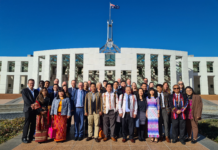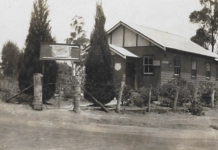
What is the purpose of worship? To begin with, the Bible tells us that we become like what we worship (Psalm 115:8), and God’s ultimate desire for us is that we become like Him (1 Peter 1:16).
We are made in His Image and the more we live in alignment with Him, the more we bring Him glory. The ultimate human expression of worship can be seen in the life of Jesus, who is our model and example. We demonstrate our worship in the way we live, when we actively do what God commands (John 15:14), when we live according to His will, when we follow in the footsteps of Jesus. Our worship gatherings, therefore, should move us toward this goal of becoming more and more like Jesus in all areas of life. Therefore, the primary purpose of worship is discipleship – that is, the forming and shaping of believers in the likeness of Christ. Whether we focus on the elements of prayer, preaching, planning, presentation or production in our church services, it is all for this end – to see people grow in their lifelong imitation of Christ.
So how can gathered worship services influence us in our discipleship? Saint Prosper of Aquitaine (390-455 A.D.) a student of the famous theologian Saint Augustine of Hippo, said, in Latin, “Lex Orandi, Lex Credendi”1 which is translated “The law of prayer is the law of belief.” Contemporary authors have extrapolated and transcribed this ancient phrase in our contemporary vernacular as, “how we worship reflects what we believe and determines how we will live.”2 This concept reveals the profound and powerful connection between what happens in our worship gatherings and Christian discipleship.
Gathered worship is not the only influencing factor in our discipleship. The structure, style and substance of our worship gatherings can significantly shape our beliefs about God and influence the ways in which we express our Christian faith in everyday life. A good friend of mine summarises this idea when he simply says, “forms form”. In other words, when it comes to the elements, traditions, styles and formats we use our worship services, the medium isn’t necessarily the message, but it certainly influences how the message is perceived and applied in people’s lives. Everything we do in our worship services, and how we do it, whether subtle or overt, influences the ways in which our congregations are formed and shaped as followers and ambassadors of Christ.
There is a quiet warning here: the capacity of our communal worship practices to influence the spiritual formation of worshipers can be a two-edged sword. Ideally, the various elements used in our worship services will help to form in us Christ-like attitudes, beliefs and values. However, these very same elements, or at least, the ways in which we approach them, might inadvertently reinforce the dominant values of the culture instead of the values of the kingdom. This is a tricky and timeless tension for the Church, one that we should be humbly and prayerfully aware of. It is helpful and healthy for us to continually re-evaluate our worship practices in the light of God’s word and our culture. It is wise for us to seek the discernment and wisdom of God as we plan and prepare our Sunday worship gatherings.
Broadly speaking, if Saint Prosper’s principle is true, then certain kinds of worship must form certain kinds of Christians. So, what kind of disciples are being formed by our worship gatherings? If we can answer this question, we can evaluate our services with greater clarity and better discern how to plan, structure and lead them. As we grow in our understanding the purpose of our worship services we can be more deliberate about our practice and of worship.
In their book ReJesus, Frost and Hirsch describe a holistic, Hebraic model of discipleship that translates well into this discussion. In this model, a “full orbed, biblical engagement with God”3 occurs when right thinking (orthodoxy), right feeling (orthopathy) and right acting (orthopraxy) overlap. For our worship services to holistically influence and form believers into mature disciples, we should be aiming to craft weekly worship services that contain these three elements. “It is in the place where the head, heart and hand overlap that we find our way to Jesus.”
If the goal of our worship gatherings is to create communities of disciples who are being formed holistically (head, heart and hands) in the likeness of Christ, here are a just a few things to consider when it comes to creating discipleship-oriented worship services:
1. Start a worship conversation.
We need to delve deeper into discussions about how we can create worship gatherings that are holistically shaping mature disciples for God’s kingdom. As we get clearer on the why of worship, we can discern how to shape our worship services according to the spiritual DNA and culture of our distinct worshiping communities.
2. Define effective worship ministry.
Worship ministry should be evaluated based on how well our gatherings result in deeper spiritual formation, over time, among those who regularly attend. While this can be frustratingly difficult to quantify, it is true that “what you measure is what you treasure.” If we only measure things like church attendance or musical excellence in our worship services, how do we know if we are forming believers in the likeness of Christ?
3. Turn Passengers into Participants.
It is easy with our cultural conditioning to bring a consumer mindset to worship. But worship is not a spectator sport. The word “liturgy” (which is simply the collective elements of a worship service, whatever your tradition) means, “work of the people”. The role of the worship team is not to worship for everyone else, but it is to enable as many people as possible to engage with God in worship.
4. Tell the Story.
Our culture often tells us that we are the most important person in the world, but our Christian faith utterly subverts this worldview. Our worship should help us recall and retain the perspective that Christ is at the centre of the universe, not us. We find significance, healing, hope, restoration and purpose in life by placing our lives completely in His hands. We can ensure we tell this grand Story by making Jesus central in all our worship services.
Discipleship-oriented worship gatherings are not an end in themselves. When disciples gather and grow together, Christian community flourishes. And without a mission, the church would have no reason to gather. Thus, embracing a shared sense of mission strengthens the bond of love within the worshiping community as they participate and partner together around the cause of the Gospel and the coming kingdom. Church is not just a once-a-week event, for we are the Church, and our weekly worship gatherings ought to help us become all that God intends us to be – becoming more and more like Christ, becoming Christian.



































